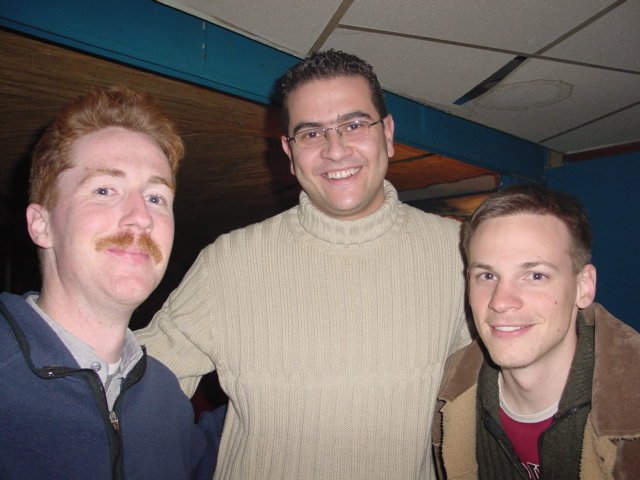February 10, 2003
Elizabeth admires the morning view from our balcony.
We left Zababdeh and its spectacular view at 6:30 with one of the teachers from the University who has been getting more and more interested in the many creative peace movements on both sides of the Green Line. It's the first time either of us has been in Ramallah since Marthame went for a few hours with the Presbyterian Church group in October, and the first time we've spent any time here since studying at Birzeit in 2001.
We arrived at the Qalandia intersection at about 9:00 after some delay at the Tayasir checkpoint - sitting for half an hour waiting for any soldier to come and take interest in the twenty taxis waiting in front of us for the gate to be opened. The Orwellian Qalandia checkpoint has evolved into its present state of affairs over the last two and a half years. Once no more than a quick security check, it has been built up with cement barricades funneling masses of people and cars (only Israeli plates, ambulances, or diplomatic cars might pass) into long lines to await permission or refusal. It's loud and muddy and crowded - and looks like a cross between an international border crossing and an animal herding station. We grabbed a taxi on the other side, headed towards the center of Ramallah, noticing the new billboards in Arabic warning children not to play with Israeli handgrenades they might find. Sobering...
Ramallah is an amazing city, and it has been far too long since we've had time to spend here. We found our way to a nearby hotel before stopping in to drop off a cassette - the production of the Christmas Pageant has become a tedious tale, but now it remains to translate one cassette from International format to American. Ramallah is one of the few places in the area where folks might be able to do such a thing.
We visited with Fr. Fadi, Ramallah's Anglican priest, who is not only originally from Zababdeh, he is also Fr. Firas' brother. He and his wife are expecting their first child, and the future grandparents - from Zababdeh and Amman - are in town to welcome the child. We had lunch and discussed a number of things, from Fr. Fadi's studies at the Presbyterian-founded Near East School of Theology in Beirut to his difficulties serving the parish here and in Birzeit - sometimes his travel between Ramallah and Birzeit is blocked, despite the Vatican travel documents he carries.
People in town are getting ready for the 'Eid al-Adha holiday tomorrow with last minute shopping and the like. We caught up with friends in the evening at Stones, a Ramallah restaurant across the street from the Melkite Convent, serving Western food in a Western atmosphere. Conversations at the tables around are half in Arabic and half in English, and that's just the locals.
Catching up with old friends in Ramallah.
The friends we caught up with were students at the Friends' School when Marthame first came to Palestine in 1993. Since then, one has gone on to get his Bachelor's from Hope College and stayed on to get his MBA in the States before returning - he now works with the UN Development Program (UNDP); another traveled to Germany to study and now works with PalTrade, a Ramallah consortium which brings international business investment to the area; the third finished up her studies in Jordan and now works as a speech and hearing pathologist, traveling around the West Bank and working with local clinics and families who have special-needs children. Far from being a minority in Ramallah, such young professional types make up an important part of the character of this city.
Ramallah’s Stones restaurant is a great place to meet up.
We talked with them about all kinds of topics, from religion to politics to the situation. A few days ago, the one who works with UNDP was threatened at gunpoint by Israeli soldiers while driving his UN car with UN plates and a UN flag. He also carries a UN ID in case there was any question. All three of these young people had every opportunity - and every reason - to leave and to stay gone. But they chose to come back, and they chose to help build a Palestinian civil society with opportunities for all.
They grew up as children of the first Intifada; one told us as a teen she spent a night in Israeli "children's jail" - she and her friends were arrested for practicing dabke, traditional Palestinian dance. These folks have a resentment for those who came back to Ramallah post-Oslo to enjoy the high-life and re-emigrated once the going got rough. For Marthame, having been greatly shaped by his experiences in Ramallah ten years ago - so much that he wanted to come back, such a reunion was wonderful.



